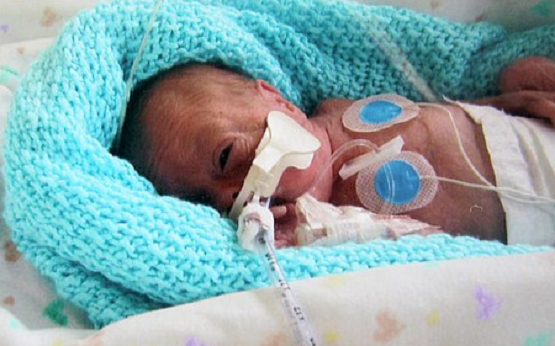An ever-increasing number of babies survive birth at earlier and earlier stages of prematurity. This welcome outcome is due in no small part to the development of specialized, neonatal “NICU” hospital units. And now music therapists are devising interventions to help preemies thrive in the NICU and beyond.
An article published in the journal “Pediatrics” last year described how music can benefit premature babies. Researchers from Beth Israel Medical Center in New York City studied 11 hospitals and nearly 300 premature infants and documented the way music helped parents transform their favorite tunes into lullabies.
 “The researchers concluded that live music, played or sung, helped to slow infants’ heartbeats, calm their breathing, improve sucking behaviors important for feeding, aid sleep and promote states of quiet alertness,” according to Pam Belluck. “Doctors and researchers say that by reducing stress and stabilizing vital signs, music can allow infants to devote more energy to normal development.”
“The researchers concluded that live music, played or sung, helped to slow infants’ heartbeats, calm their breathing, improve sucking behaviors important for feeding, aid sleep and promote states of quiet alertness,” according to Pam Belluck. “Doctors and researchers say that by reducing stress and stabilizing vital signs, music can allow infants to devote more energy to normal development.”
A University of Kansas assistant professor of music therapy, Deanna Hanson-Abromeit (right), is among those at the forefront in demonstrating how music helps premature infants survive and thrive, according to an October 6 feature in the online Kansas Health Institute report [“KU professor develops music therapy for premature infants”].
Hanson-Abromeit explains that premature infants are overwhelmed with information: noise, light, new people. A neonatal intensive care unit can be especially chaotic, and the babies’ brains aren’t developed enough to handle it all. The stress puts their nervous system into fight-or-flight mode, which robs them of the energy and focus their brains and nervous systems need to help them grow.
 “We’re really trying to help them at a very basic neurological level organize at staying calm,” Hanson-Abromeit told KHI reporter, Alex Smith, and pre-recorded music won’t do the trick. Helping infants’ brains develop requires something more subtle: the kind of attentive interaction practiced by therapists such as Hanson-Abromeit.
“We’re really trying to help them at a very basic neurological level organize at staying calm,” Hanson-Abromeit told KHI reporter, Alex Smith, and pre-recorded music won’t do the trick. Helping infants’ brains develop requires something more subtle: the kind of attentive interaction practiced by therapists such as Hanson-Abromeit.
Though the field has made great strides with the help of neuroscience, she believes there’s still a lot to learn from the basics of music therapy. Part of Hanson-Abromeit’s ongoing research is playing the guitar for children at Operation Breakthrough, an early education child care and social services facility in Kansas City, Mo.
“We can change those characteristics of the music to be less complex,” she said. “And then build that up gradually for more complexity as the baby’s neurological processes can handle that, or we help them start to develop those things.”
Click here to sign up for daily pro-life news alerts from LifeNews.com
In 2013, Hanson-Abromeit joined with researchers in the United Kingdom and Australia to form Music and Neuro-Developmentally At-Risk Infant, or MANDARI. Their goal is “to explore how music therapy affects the brain,” Smith explained. “The group had its first international conference this summer.”
As music therapy continues to gain professional respect, Hanson-Abromeit hopes her work will help take music intervention beyond the exclusive realm of the professional therapist to use by parents to adapt music to help manage the symptoms that their babies are experiencing, whether it’s pain or agitation or discomfort.
Not only does this sound promising for direct therapeutic interventions for preemies, imagine extending that knowledge so that all parents would know exactly how to soothe a colicky baby!
LifeNews.com Note: Kathy Ostrowski is the legislative director for Kansans for Life, a statewide pro-life group.







